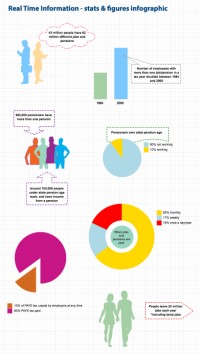UK companies have just eight weeks to change their software to handle real-time taxes

The UK's tax authorities are changing to a new system where companies have to tell the government every time they pay someone under PAYE (Pay As You Earn), and they have only eight weeks to adapt their current software or buy new programs. The change affects about 43 million people, and is the biggest change since PAYE was introduced almost 70 years ago, when Winston Churchill was prime minister.
Her Majesty's Revenue & Customs (HMRC) reckons the switch to monthly reporting will save money. The problem is that, according to a DTE Business Advisers' survey of 126 SMEs, "96 percent of companies or their clients had no knowledge of the changes, or those who do, had no idea of its implementation".
The new system, called RTI (Real-Time Information), comes into force in the next tax year, which starts on 6 April, 2013. It is needed to support the switch to another UK government idea, Universal Credit.

HMRC has posted an online guide, Preparing to operate PAYE in real time (RTI), on its website. It includes a page on Payroll options and software packages. Unusually, it has also published a colourful infographic showing RTI stats & figures (I've posted the large version online).
In this case, "real time" means "within seven days".
Companies have had advance warning, and ZDNet published a substantial story more than two years ago: The future of PAYE: How the 66-year-old tax system is changing. HMRC has also been running a pilot project with 500 employers.
But only three months ago, the Institute of Chartered Accountants in England and Wales (ICAEW) said the new PAYE requirements were "at best unrealistic and at worst impossible".
Currently, HMRC is writing to all the UK's employers to remind them of the impending change. Firms that do not comply will face penalties.
The system should mean that employees pay the right amount of tax throughout the year, instead of adjusting the total once a year. It should also ensure that HMRC gets its cut, though this may make life difficult for companies with cash-flow problems. (You can underpay HMRC and catch up at the end of the year — if you have the cash. We may therefore see more companies go bust quicker.)
HMRC reckons it will collect an extra £3bn during the year, rather than having to wait for the end of the year.
HMRC also says that "RTI will increase the accuracy of HMRC's information about tax credits claimants, enabling better detection of fraud and error in the system and potentially saving the UK hundreds of millions of pounds."
Finally, HMRC reckons that employers will save "£300m in reduced administration costs once the system is up and running". Since there are roughly 5 million private businesses operating in the UK, this represents a saving of £60 each. Given the hourly rates charged by chartered accountants, it's hard to see this as a good deal… except for chartered accountants and software houses.